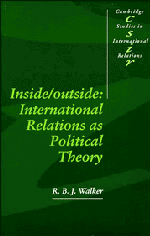Book contents
- Frontmatter
- Contents
- Preface
- 1 International relations as political theory
- 2 The Prince and ‘the pauper’
- 3 Ethics, modernity, community
- 4 History, structure, reification
- 5 Realism and change
- 6 The territorial state and the theme of Gulliver
- 7 On the spatio-temporal conditions of democratic practice
- 8 Sovereign identities and the politics of forgetting
- Notes
- Bibliography
- Index
3 - Ethics, modernity, community
Published online by Cambridge University Press: 05 July 2011
- Frontmatter
- Contents
- Preface
- 1 International relations as political theory
- 2 The Prince and ‘the pauper’
- 3 Ethics, modernity, community
- 4 History, structure, reification
- 5 Realism and change
- 6 The territorial state and the theme of Gulliver
- 7 On the spatio-temporal conditions of democratic practice
- 8 Sovereign identities and the politics of forgetting
- Notes
- Bibliography
- Index
Summary
At the intersection
What is often characterised as an intersection marked ‘ethics and international relations’ is once again a site of industriousness and vitality. Stanley Hoffmann has even gone so far as to suggest that the appearance of a renewed literature seeking to treat relations between states as a proper subject for ethical inquiry has been one of the two major developments in the analysis of world politics over the past decade. For Hoffmann, it shares this honour with the ‘scientific’ (or liberal-utilitarian) analysis of conflictual co-operation and inter-state regime formation.
This chapter is motivated by a similar sense of the importance of work being conducted under the sign of ‘ethics and international relations’. It is also interested in its relation to the recent popularity of liberal-utilitarian accounts of inter-state co-operation. But I am concerned primarily with the extent to which so much of the literature is informed by the highly problematic assumption that ‘ethics and international relations’ is indeed the name of an intersection, a junction between two separate areas of disciplinary inquiry. This image reflects a pervasive sense that the task before us is primarily one of application or extension. ‘Ethics’ comes to be understood as an achieved body of principles, norms and rules already codified in texts and traditions. And ‘international relations’ is understood as a realm of recalcitrant practical problems in dire need of greater moral scruple.
- Type
- Chapter
- Information
- Inside/OutsideInternational Relations as Political Theory, pp. 50 - 80Publisher: Cambridge University PressPrint publication year: 1992

